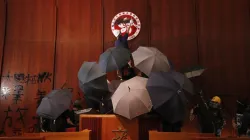Hong Kong sentences 12 to prison for storming legislature during 2019 pro-democracy protests
Those sentenced include Gregory Wong, 45, for six years, along with political activists Ventus Lau and Owen Chow. District court Judge Li Chi-ho, who handed the sentences, said the incident was a "serious blow" to the rule of law when protesters vandalised the city legislature.

Hong Kong: A Hong Kong court sentenced 12 people to prison terms from over four years to nearly seven years for storming the city legislature during the months-long pro-democracy protests in 2019. The protests were a pivotal moment in the China-ruled semi-autonomous city in the boldest populist uprising against Chinese Communist Party rule since the 1989 Tiananmen Square protests in Beijing.
Protesters broke into Hong Kong's legislative council building on July 1, 2019, smashing windows and streaming inside as public anger mounted over an extradition bill that would have allowed authorities to send people to mainland China for trial. District court Judge Li Chi-ho, who announced the sentences, said the incident was a "serious blow" to the rule of law.
Those sentenced included Gregory Wong, 45, who was jailed for six years and two months after pleading not guilty. Political activists Ventus Lau and Owen Chow, who had pleaded guilty, received terms of 54 months and 20 days, and 61 months and 15 days, respectively.
What did the court say?
"The large number of protesters, the intensity, the unique constitutional status of the Legislative Council, and the intention to weaken the significance of the (Hong Kong) government, are insulting," Li said, detailing how protesters rammed their way into the building with metal barricades, pelted the area with eggs , sprayed political slogans on walls and inked over a government emblem.
The former president of the University of Hong Kong's student union, Althea Suen, 27, who had pleaded guilty, was sentenced to four years and nine months. Relatives and supporters of those sentenced cried and shouted "Take care!" and "Hang in there!" as the defendants were led away from the glass dock.
Beijing drastically hardened its stance on Hong Kong after the massive in 2019 turned violent and plunged the city into a months-long crisis. It also enacted a draconian national security law, since which dozens of pro-democracy activists have been arrested, and the movement’s young leaders have either been jailed or fled abroad.
What did the defendants say?
Owen Chow said the government's refusal to withdraw the extradition bill after one million people marched against it was the immediate cause of the incident. "No matter what punishment the court imposes on me, I'll continue to move forward and convert my fear into a force for change, just like the day I walked into the chamber," Chow told the court.
He said their actions stemmed from a need to stand up for basic human rights that were under threat from authorities. "Martin Luther King, leader of the human rights movement who has always advocated peaceful and rational demonstrations, once said, "A riot is the language of the unheard," Chow told the court.
Ventus Lau, who returned to Hong Kong despite the risk of prosecution, said he had rushed to the scene given his fears of a bloody crackdown by the police. "I don't want the public to think all the people in this movement only care about their own safety," he said.
In a mitigation letter submitted to the court last month, actor Wong said his arrest and conviction had essentially derailed his career as an actor since the age of 12. "I will still help people in need with a sincere heart," Wong wrote.
China intensifies crackdown
The case also involved two other defendants who were reporters. They were previously acquitted of the rioting charge but were convicted for unlawful entry into the legislature. One was fined 1,500 Hong Kong dollars ($192) and the other 1,000 Hong Kong dollars ($128), Li said. After the sentences were handed down, some supporters of the defendants cried in the courtroom and many others waved at the accused.
Rioting holds a maximum seven-year sentence in Hong Kong's district court. More than 10,200 people were arrested in relation to the protests in 2019, of whom 2,937 have so far been charged with offences including rioting, unlawful assembly and criminal damage, according to police figures. Of these, over 870 people have been charged with rioting, according to reports.
Hong Kong government said the enactment of the national security law helped bring back stability to the city after the massive 2019 protests. However, many of the city's leading activists have been arrested under the law, while others fled abroad fear risk of prosecution.
(with inputs from agencies)
ALSO READ | Hong Kong introduces new national security draft bill with tougher penalties to stifle dissent